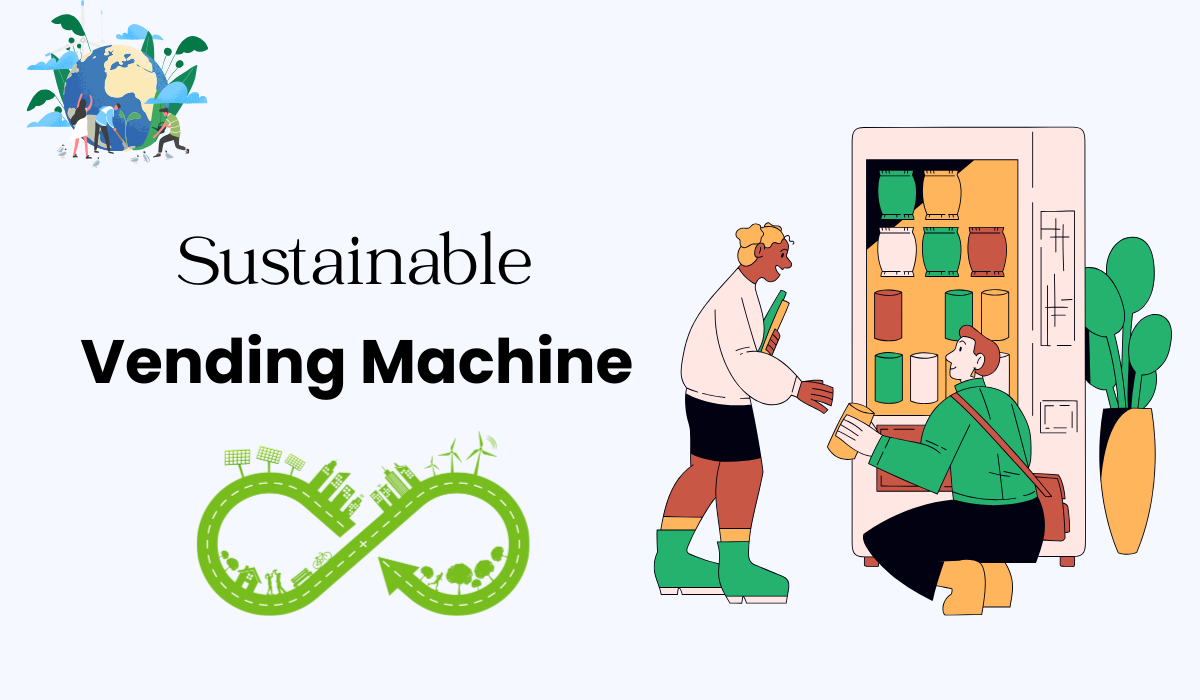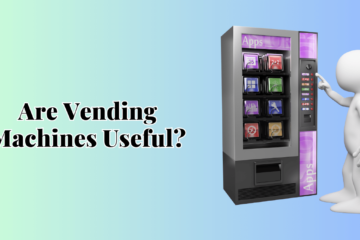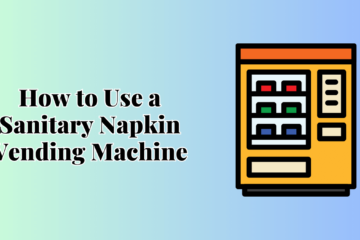The vending machine industry has evolved significantly over the years, shifting from simple snack dispensers to high-tech, interactive devices. As sustainability becomes a critical aspect of modern business practices, the vending machine market is also embracing eco-friendly innovations. This blog explores how sustainable vending machines are transforming the market, benefiting both businesses and the environment.
The Rise of Eco-Friendly Vending Machines
Historical Context: Traditional Vending Machines and Their Environmental Impact
Traditional vending machines, while convenient, have often been criticized for their environmental impact. They consume significant amounts of energy, rely heavily on single-use plastics, and contribute to waste through excessive packaging.
Factors Driving the Shift Towards Sustainability
Several factors are driving the shift towards sustainable vending machines. Increased consumer awareness, stricter environmental regulations, and the growing corporate focus on sustainability are all contributing to this trend.
Overview of the Rise of Eco-Friendly Vending Machines
Eco-friendly vending machines are emerging as a response to these challenges, incorporating various sustainable technologies and practices to minimize their environmental footprint.
Energy-Efficient Technologies
Introduction to Energy-Efficient Refrigeration and Lighting
Modern vending machines are incorporating energy-efficient technologies, such as advanced refrigeration systems and LED lighting, to reduce energy consumption.
Benefits of Using Energy-Efficient Technologies in Vending Machines
Energy-efficient technologies not only reduce operational costs but also lower the carbon footprint of vending machines, making them more environmentally friendly.
Examples of Vending Machines Utilizing These Technologies
Examples include vending machines with Energy Star certification, which use up to 40% less energy than standard models, and machines with motion-sensor lighting that only activates when a user is present.
Solar-Powered Vending Machines
Description and Benefits of Solar-Powered Vending Machines
Solar-powered vending machines harness solar energy to operate, significantly reducing reliance on traditional energy sources.
Case Studies of Successful Implementations
Several cities and universities have successfully implemented solar-powered vending machines, demonstrating their viability and benefits.
Impact on Energy Consumption and Carbon Footprint
By using renewable energy, these machines drastically cut down on energy consumption and carbon emissions, contributing to a greener planet.
Use of Recyclable and Biodegradable Materials
Importance of Using Eco-Friendly Materials in Vending Machine Construction
Constructing vending machines from recyclable and biodegradable materials helps reduce waste and the environmental impact of production.
Examples of Vending Machines Made from Recyclable and Biodegradable Materials
Some vending machines are now made from recycled metals and plastics, while others use biodegradable materials for parts that need frequent replacement.
Environmental Benefits and Consumer Perception
Using eco-friendly materials enhances the machine’s sustainability and positively influences consumer perception, as more people prefer products that are environmentally responsible.
Smart Inventory Management to Reduce Waste
How Smart Inventory Systems Help in Reducing Product Waste
Smart inventory systems use real-time data to manage stock levels efficiently, reducing the risk of expired or unsold products.
Techniques for Efficient Stock Control
Techniques include predictive analytics to forecast demand, automated restocking alerts, and IoT-enabled sensors to monitor inventory levels.
Benefits for Both the Environment and Businesses
Efficient stock control reduces product waste, lowers costs for businesses, and minimizes environmental impact by ensuring only necessary items are stocked.
Water-Saving Technologies
Introduction of Water-Efficient Technologies in Vending Machines
Water-efficient technologies in vending machines help conserve water, a crucial resource, especially in beverage vending machines.
Examples of Beverage Vending Machines Utilizing Water-Saving Features
Some beverage vending machines use advanced filtration systems that minimize water usage, while others recycle water used in the cooling process.
Impact on Water Conservation
These technologies contribute to significant water savings, benefiting both the environment and communities facing water scarcity.
Reduced Packaging Solutions
Innovations in Reducing Packaging Waste
Innovations such as minimal and biodegradable packaging help reduce the waste generated by vending machines.
Examples of Vending Machines Promoting Minimal Packaging
Machines offering loose items, such as fresh fruit or bulk snacks, and those using biodegradable packaging are gaining popularity.
Environmental and Economic Benefits
Reducing packaging waste lowers costs for producers and vendors, decreases environmental impact, and appeals to eco-conscious consumers.
Digital and Contactless Payment Systems
The Rise of Digital and Contactless Payments
The adoption of digital and contactless payment systems in vending machines is on the rise, driven by the need for convenience and hygiene.
Reduction in Paper and Plastic Waste
These payment systems reduce the need for paper receipts and plastic cards, contributing to waste reduction.
Benefits for Users and the Environment
Digital payments offer a seamless transaction experience for users while promoting environmental sustainability by reducing waste.
Recycling and Waste Management Features
Integration of Recycling Bins and Waste Collection Systems in Vending Machines
Some vending machines now include built-in recycling bins and waste collection systems to encourage proper disposal of packaging and other waste.
Encouraging Users to Recycle Through Convenient Features
Convenient recycling features make it easier for users to recycle, fostering environmentally friendly habits.
Success Stories and Impact Statistics
Case studies show significant reductions in waste and positive user feedback when recycling features are integrated into vending machines.
Long-Lasting and Durable Components
Importance of Using Durable Components to Extend Machine Lifespan
Using long-lasting and durable components in vending machines extends their lifespan, reducing the need for frequent replacements.
Examples of Vending Machines with Long-Lasting Parts
Examples include machines with robust steel frames, durable touchscreens, and high-quality refrigeration units.
Environmental and Economic Advantages
Durable components reduce waste, lower maintenance costs, and provide better long-term value for businesses.
Consumer Acceptance and Demand
Growing Consumer Awareness and Demand for Sustainable Options
Consumer awareness and demand for sustainable products are at an all-time high, influencing the vending machine market.
Impact of Sustainability on Consumer Choices
Sustainability is becoming a key factor in consumer choices, with many preferring eco-friendly vending options.
Examples of Positive Consumer Feedback and Increased Usage
Studies show that consumers are more likely to use vending machines that offer sustainable options, leading to increased usage and positive feedback.
Economic Benefits for Businesses
Cost Savings Through Energy Efficiency and Reduced Waste
Sustainable vending machines offer significant cost savings through energy efficiency and reduced waste, improving profitability.
Long-Term Financial Benefits of Sustainable Practices
Investing in sustainable practices provides long-term financial benefits, including lower operational costs and increased customer loyalty.
Examples of Businesses Thriving with Sustainable Vending Machines
Many businesses that have adopted sustainable vending machines report increased profitability and positive brand perception.
Future Trends and Innovations
Emerging Trends in Sustainable Vending Machine Technology
Future trends in sustainable vending machine technology include further advancements in energy efficiency, smart technology, and materials science.
Potential Innovations on the Horizon
Potential innovations include fully autonomous vending machines, advanced AI for better stock management, and even more sustainable materials.
Predictions for the Future of the Vending Machine Market
The vending machine market is expected to continue its shift towards sustainability, driven by technological advancements and increasing consumer demand for eco-friendly options.
Conclusion
Recap of the Key Points on Sustainable Vending Machines
Sustainable vending machines are transforming the market by incorporating energy-efficient technologies, using recyclable materials, reducing waste, and enhancing consumer experience.
The Transformative Impact on the Market and the Environment
These innovations are not only improving the vending machine industry but also making a significant positive impact on the environment.
Final Thoughts on the Importance of Continuing Sustainable Practices
Continuing to adopt and innovate sustainable practices in vending machines is crucial for the future of the industry and the health of our planet. By embracing these changes, we can create a more sustainable and profitable market for all.
FAQs
1. What are sustainable vending machines?
Sustainable vending machines are designed with eco-friendly technologies and practices to minimize their environmental impact, such as energy-efficient systems, recyclable materials, and smart inventory management.
2. How do solar-powered vending machines work?
Solar-powered vending machines use solar panels to convert sunlight into energy, reducing reliance on traditional power sources and lowering carbon emissions.
3. What are the benefits of using recyclable materials in vending machines?
Using recyclable materials reduces waste, lowers environmental impact, and improves consumer perception, as eco-friendly products are increasingly preferred.
4. How do digital and contactless payments reduce waste?
Digital and contactless payments eliminate the need for paper receipts and plastic cards, reducing waste and promoting a cleaner environment.
5. What future trends can we expect in the vending machine industry?
Future trends in the vending machine industry include advancements in energy efficiency, smart technology integration, autonomous machines, and the use of even more sustainable materials.




